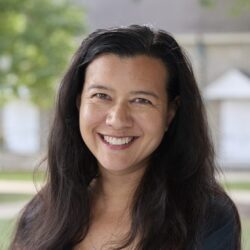Why Gender-Inclusive Language Matters
I was heartened to learn of WAA’s recent decision to change its name from “Westtown Alumni Association” to “Westtown Alums Association.” As the WAA Board had noted prior to the decision, “‘Alumni,’ the word we currently use, is the plural masculine form of the Latin word alumnus/a. Traditionally, ‘alumni’ has been used as a collective noun for all genders but is currently perceived as a word that refers primarily to men. In order to be explicitly gender-inclusive, Westtown had been using ‘alumni/ae/x’ to refer to groups of alums. However, to simplify the gender-inclusive terminology, Westtown adopted the convention of using ‘alum/alums.’ These terms are accepted by Merriam-Webster and the AP Style Guide (among others) as gender-neutral alternatives to ‘alumni.’”
Before the WAA meeting, I had heard from a number of Westtown’s LGBTQ+ community members about how the change from “alumni” —or even “alumni/ae/x”—to the more inclusive “alums” impacts their own feelings of belonging. I want to provide my own perspective as to why this change matters, as this may seem so minor an alteration that some community members may question whether it’s worth changing a longstanding, traditional term.
A growing body of research discusses the impact of gendered languages on our minds, behaviors, and societies. In one series of studies, economists Pamela Jakiela and Owen Ozier at the World Bank explored the relationship between the grammatical structure of 4,334 languages and outcomes for women around the world–female labor force participation, educational achievement, and gender norms. They looked specifically at whether people spoke languages that were gendered (with masculine and feminine noun forms) or languages without such forms. After controlling for geographic and economic factors, they found that women in societies that use gendered language are 15% less likely to participate in the labor force relative to men, and both women and men who speak gendered languages are more likely to agree with more traditional gender roles (for example, that university education is more important for boys than girls, and that men make better political leaders and business executives than women). In four countries where both gendered and non-gendered Indigenous languages are spoken, speaking a gendered native language is associated with lower labor force participation and educational attainment for women compared with men. How could language exert such an impact on society? Recent research based in Sweden indicates “compared with masculine pronouns, use of gender-neutral pronouns decreases the mental salience of males. This shift is associated with individuals expressing less bias in favor of traditional gender roles and categories, as reflected in more favorable attitudes toward women and LGBT individuals in public life.”
Specifically focused on trans and nonbinary people, a study in Australia demonstrated that the use of inclusive language was directly related to the wellbeing of trans employees. This study fits within a larger body of work indicating that use of inclusive language is key to the wellbeing of transgender, gender diverse, and non-binary individuals in the workforce, as well as gender expansive adolescents in school environments.
As someone who studied Latin for six years, I do sympathize with people who may be attached to linguistic traditions. But the shift towards less gendered language also has deep roots. Long before American society shifted from “fireman” to “firefighter” and from “stewardess” to “flight attendant,” English itself shifted from Old English, a language with strict grammatical genders, to Middle English, a language without. Worldwide, languages are currently shifting to become more gender-inclusive.
Besides accommodating the preferences of historically marginalized members of the current alum community, the WAA decision sends an honest signal to current Westtown students and others about the value we place on being a community that lives out its commitment to “seek out and honor God in each of us”, as our Mission statement declares. Particularly at a time in which the human rights of transgender individuals are under legislative assault, such signals are very much needed and welcome.
Louisa Egan Brad
Dean of Equity, Justice, and Belonging



